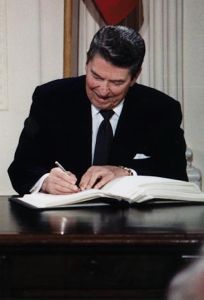[ad_1]
We all know that the subject of presidential health has been well documented in recent years. Every time the commander in chief has a check-up, the results are made public. It wasn’t always this way, however; throughout most of history the health of the president was a closely guarded secret. Fortunately things have changed, because media coverage regarding the president’s health can be beneficial to the American people by increasing awareness and reducing stigma. Hearing health is no different.
While many presidents throughout history have experienced some degree of hearing loss, the causes vary. Hearing loss can occur due to age, illness, accident or exposure to loud noises. According to the National Institute on Deafness and Other Communication Disorders (NIDCD), 25 percent of Americans over age 65 and 50 percent of those over age 75 are experiencing some degree of hearing loss. And when it comes to hearing health, presidents are just like us.

Reagan was the first president
to wear hearing aids? He, along
with many other presidents,
suffered from hearing loss and
was an advocate for hearing
loss awareness.
By 1789, President George Washington had difficulty hearing conversations. President Thomas Jefferson’s hearing difficulties are also well-documented. In 1819 he wrote, “My hearing is distinct in particular conversation, but confused when several voices cross each other, which unfits me for the society of the table.” In 1825, he wrote, “This [hearing] dullness of mine causes me to lose much of the conversation the world and much a stranger to what is passing in it.” Speculation is that his love of shooting led to his hearing loss.
And what about President Theodore Roosevelt? True, he earned a reputation of toughness and determination. The Hero of San Juan Hill and the creator of the Bull Moose Progressive Party, he was known as “The Lion,” and even survived an assassination attempt. But it turns out even the leader of the Rough Riders wasn’t immune to hearing loss, as after leaving office he lost the hearing in his left ear when surgery for an abscess caused a ruptured ear drum.
President Herbert Hoover also experienced hearing loss, though his condition was age-related. According to his New York Times obituary he ‘had become very hard of hearing lately, and aides and interviewers sometimes had to stand close and shout. “I’m used to being hollered at,” he assured one visitor. Indeed, President Hoover was known to use his hearing aid to his advantage. Once in later life, Hoover was present for a speech being given by NASA chief Jim Webb. Walt Williams recounted, “He asked who that was. When I told him Jim Webb, he turned his hearing aid off and asked me to poke him when Webb was finished.” He did not allow his hearing loss to impact him, though, and remained active in party politics and both foreign and domestic relations until the time of his death in 1964.
President Ronald Reagan lost hearing in one ear when a .38 caliber blank was fired too close to him on a movie set. In 1983 he became the first sitting president to wear hearing aids, and made no secret of it. The timing of the announcement of the president’s use of assisted listening devices was fortuitous, because it came at a time when the hearing equipment industry had been hit by a recession. Reagan’s use of hearing aids encouraged a more widespread acceptance of hearing aids, resulted in increased sales, and reduced the stigma associated with hearing loss. Reagan declared May 1986 as “Better Hearing and Speech Month,” bringing the issue of hearing health to the forefront. In 1988, he was fitted with a new set of hearing aids that also featured a not-yet-released remote control, which sent the Secret Service into a tailspin; they were (incorrectly, it turns out) concerned that the remote control would allow foreign spies to eavesdrop on Reagan’s conversations.
Often referred to as “the MTV President” due to his televised saxophone playing during the campaign, President Bill Clinton was diagnosed with high frequency hearing loss while in office. Exposure to loud saxophone music, countless political rallies and hunting rifles may have been partly to blame. His announcement in 1997 of his use of in-the-canal (ITC) hearing aids helped to further reduce the stigma of hearing loss and put a positive spin on the use of hearing aids.
Proving hearing loss does not have to impact quality of life, Presidents Nixon, Ford, Carter, and George H.W. Bush all used hearing aids after leaving office. The use of hearing aids has allowed them to lead full post-presidential lives, travel the world as statesmen, promote charitable works and continue to have an impact on both foreign and domestic policy.
Although presidents throughout history have experienced hearing loss, it is only in recent years that they have used their hearing loss to promote healthy hearing and the betterment of public health, thus removing the stigma of hearing loss and helping to increase awareness. So if you are experiencing hearing loss, take a page from the book of many former presidents and consult with a hearing healthcare professional. You can take comfort in knowing you are in elite company.
[ad_2]
Source link

